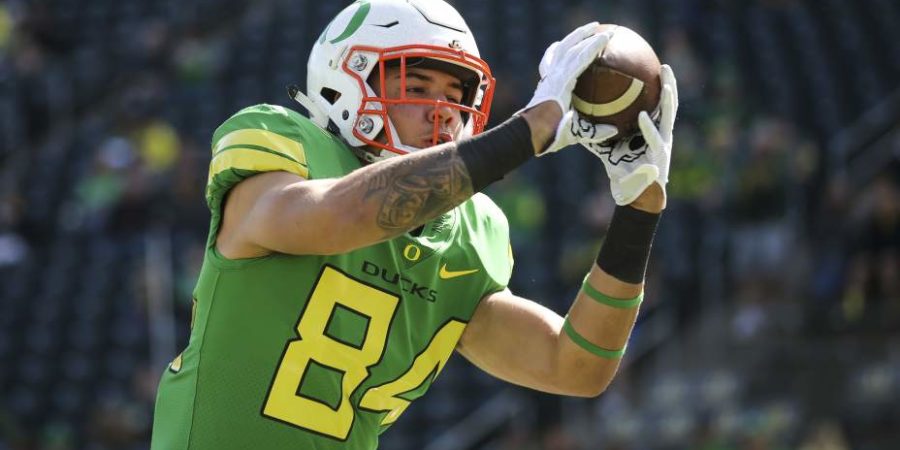Aside from a few tense moments when the Ducks fell behind 10-0 in the first quarter of Saturday’s season opener vs. Bowling Green, the 58-24 outcome in favor of Oregon was about what was expected in the months leading up to the game. There are certainly things to work on, but a convincing victory at home to start the season is good medicine for alleviating any nuanced ailments Ducks head coach Mario Cristobal has diagnosed one week into the 2018 season.
Despite the victory, however, the day was at best bittersweet for redshirt sophomore tight end Cam McCormick.
McCormick, who entered Week 1 as the co-starter at tight end with Jacob Breeland, was carted off the field in the first half with what was believed to be a “significant injury” as described by Cristobal in Saturday’s postgame press conference. The bad news was confirmed Monday, as Cristobal stated in his weekly press conference with members of the media that McCormick would in fact miss the remainder of the season with a broken bone in his leg.
In 2017, the Bend native posted modest numbers, nabbing six reception for 89 yards and a touchdown, though he was expected to take on a much larger role within the Oregon offense entering 2018. McCormick’s promising offseason had him atop the tight end depth chart for much of the spring, and with Breeland having to overcome injury concerns of his own, McCormick’s emergence was a welcomed development at the tight position for the Ducks.
With a potential breakout season for McCormick now delayed until 2019, the Ducks will be forced to move on without him.
Fortunately for Oregon, depth at tight end is a considerable strength.
With McCormick sidelined, Breeland now reassumes the starting spot he held all of last season when he led all Oregon pass catchers with five touchdown receptions, to go along with 320 yards on 18 catches. Nagging back injuries have limited Breeland’s impact over the past year, but despite his tenuous status at times, a full-time starting role is something that the redshirt junior is intimately familiar with.
Breeland will be supported by USF transfer Kano Dillon and redshirt junior Ryan Bay, who appeared in 11 games last season for the Ducks. Of the two, Dillon figures to be the player that see the biggest uptick in the amount of reps he’ll receive in McCormick’s stead. Reported to have really come on towards the end of fall camp, Dillon’s 6-foot-5, 256-pound frame serves him well as an additional blocker in heavy sets, though he’s more than just a big body. While he has yet demonstrated the ability to stretch the field as well as Breeland, Dillon is a plus athlete with good speed and the ability to be a difference maker in the passing game.
In three seasons at USF, Dillon tallied 28 catches for 499 yards and four touchdowns.
Beyond Breeland, Dillon, and Bay at tight end, the Ducks also boast the talents of highly-touted true freshman Spencer Webb, as well as redshirt sophomore Hunter Kampmoyer, a converted defensive end who has figured predominantly on special teams.

